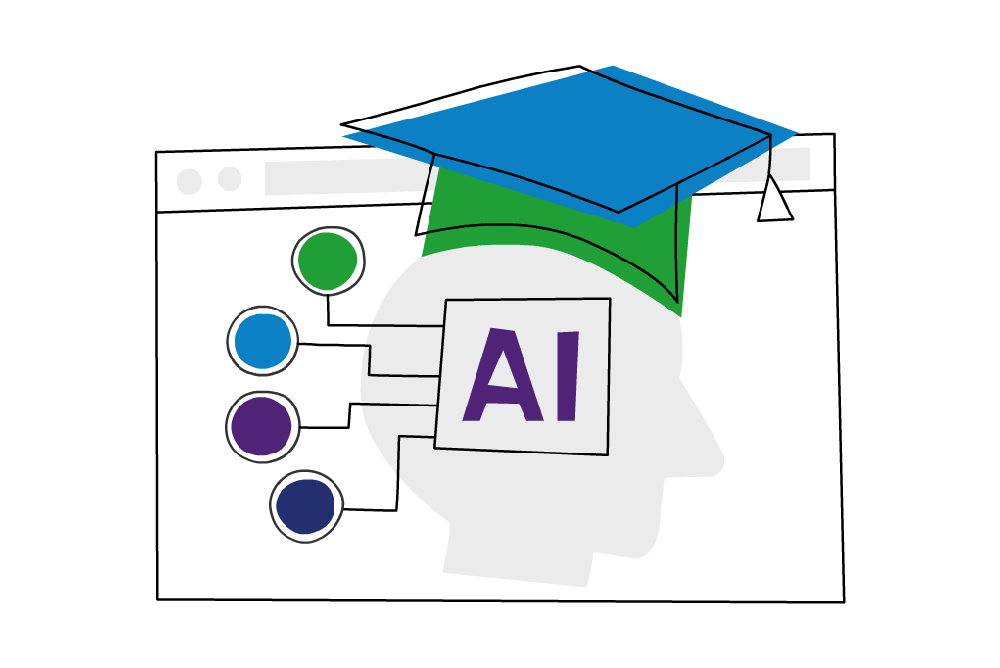
Artificial intelligence (AI) is transforming the way we work, learn, and communicate. But how do we harness its power without losing the human element? While AI can streamline processes, personalise learning, and boost productivity, relying on it too much can be problematic. The key lies in striking the right balance by leveraging AI’s strengths while keeping human expertise, creativity, and emotional intelligence at the forefront.
In this blog, we’ll explore how AI is transforming eLearning for businesses, how to manage potential risks, and how to harness its capabilities for long-term success.
AI in eLearning
The adoption of AI in eLearning is rapidly growing, with the global AI-in-education market projected to reach $25.7 billion by 2030. Global institutions are using AI for adaptive learning, virtual tutors, and personalised feedback. For example, Duolingo employs AI to customise language lessons. But challenges remain, including over-reliance on AI, which can undermine human expertise, a lack of understanding among educators about AI tools, and issues like bias that risk perpetuating inequalities. Balancing AI integration with human oversight is crucial for effective and ethical implementation.
Personalisation
One of AI’s most significant benefits to eLearning is its ability to quickly personalise training programs. AI plays a pivotal role in tailoring learning paths by analysing learner behaviour, such as progress, preferences, and performance, to create customised experiences.
Adaptive learning platforms use AI to adjust content dynamically, catering to individual needs and diverse learning styles. For example, if a sales team member excels in communication but struggles with data analysis, AI can adjust the content to focus on data skills.
However the success of AI-driven personalisation and even AI-generated content depends heavily on the quality of the data. If the data is incomplete or biased, both personalised learning paths and content creation can be flawed. To mitigate this, businesses must ensure their AI models are trained on diverse, up-to-date datasets, reflective of all employees, and free of inherent bias. Challenges like algorithmic bias, data security, and inclusivity must be addressed so that fair, safe, and effective learning is available for all users.
Automating Content Creation
AI-powered tools are increasingly used to automate content creation, saving businesses time and reducing development costs. AI tools streamline content creation by generating quizzes, interactive multimedia, and course outlines, saving time and enabling creators to focus on innovation and storytelling. For example, AI-powered translation allows global businesses to quickly roll out training content across different regions.
However, the speed of AI-driven content creation can sometimes compromise quality. For highly specialised or sensitive topics, automated content generation may not capture the nuance that a human instructional designer would.
So, human expertise is critical to fine-tuning AI-generated content, ensuring it is accurate, contextually relevant, and aligned with educational goals. It’s important to get the right balance, leveraging AI for certain tasks while still using human expertise to ensure content accuracy and relevance. This collaboration between AI and human creativity results in more impactful and engaging eLearning experiences.
Data Analytics
Another significant advantage of AI in eLearning is its ability to generate deep insights through data analytics. AI can track learner progress, identify improvement areas, and recommend real-time adjustments, helping businesses to optimise their training programs continually.
However, the sheer volume of data produced by AI systems can be overwhelming. Without a clear strategy for using this data, organisations can drown in the data, focusing too much on metrics and not enough on outcomes. It is essential that analytic tools are aligned with business goals and that you aren’t hoarding data for its sake. Data needs to be interpreted in a meaningful way to drive action.
By focusing on meaningful KPIs, such as retention rates, you can avoid data overload and prioritise impactful metrics. Transparency, learner consent, and ethical use of data are crucial to maintaining trust, ensuring that insights are used responsibly and aligned with both learner goals and privacy standards
Articulate AI Assistant
As the Exclusive Certified Australia and New Zealand Articulate training partner, we’re excited by Articulate’s new inclusion of their AI Assistant within Rise 360 and Storyline 360. Developed in collaboration with eLearning professionals, Articulate focused on creating a tool, not a toy, that supports human creators. This tool automates more routine tasks such as generating quiz questions, building slides, and providing feedback on content, helping to produce high-quality, customised courses quickly.
We believe this combination of AI and human involvement results in the most successful implementations of AI in eLearning where AI is a supplement to, not a replacement for, human expertise. It’s also important to note, that this tool is an add-on and is completely optional. We understand and respect that some clients may have hesitations about AI or may prefer not to use this technology.
The Future of AI in eLearning
The future of AI in eLearning will be shaped by emerging technologies like VR/AR, gamification, and AI tutors, creating immersive, personalised learning experiences. Over the next decade, we could see fully adaptive systems that blend virtual environments with real-time feedback, making education more accessible and engaging. However, it is essential to remember that continuous oversight and human guidance will remain critical to ensure ethical use, contextual relevance, and the nurturing of creativity and empathy in education.
How can we help?
At B Online Learning we’re experts in every facet of online learning. We bring our invaluable technical skills and knowledge of AI to eLearning development while combining it with the human touch in instructional and graphic design to ensure courses are engaging, relatable, and effective. By utilising the strengths of the latest technology and combining it with human creativity and uniqueness, we create a comprehensive eLearning experience that meets the diverse needs of learners.
How are you integrating AI into your eLearning strategy while keeping the human touch? Please get in touch with us to find out how we can help with your eLearning content development leveraging AI Assistant in Articulate.



